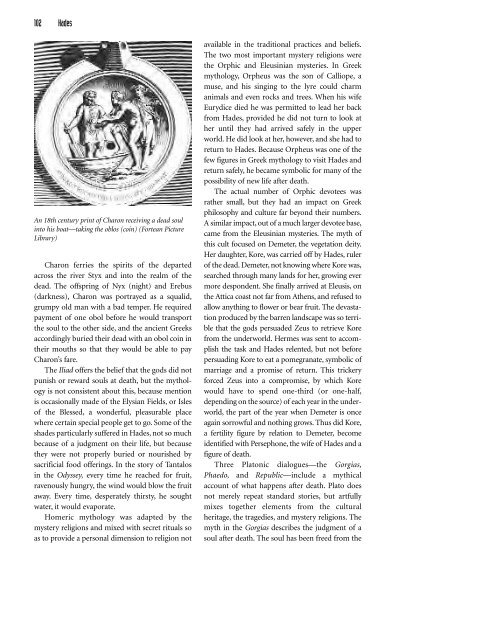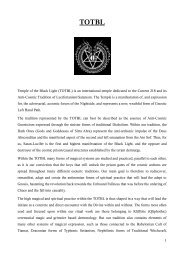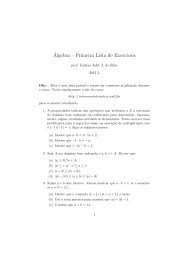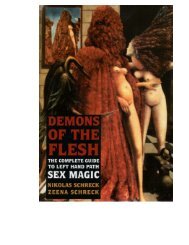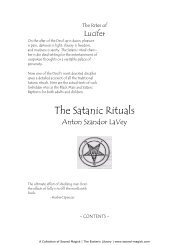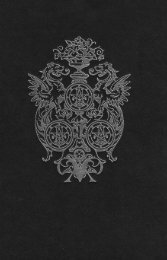Satanism Today - An Encyclopedia of Religion, Folklore and Popular ...
Satanism Today - An Encyclopedia of Religion, Folklore and Popular ...
Satanism Today - An Encyclopedia of Religion, Folklore and Popular ...
Create successful ePaper yourself
Turn your PDF publications into a flip-book with our unique Google optimized e-Paper software.
102 Hades<br />
<strong>An</strong> 18th century print <strong>of</strong> Charon receiving a dead soul<br />
into his boat—taking the oblos (coin) (Fortean Picture<br />
Library)<br />
Charon ferries the spirits <strong>of</strong> the departed<br />
across the river Styx <strong>and</strong> into the realm <strong>of</strong> the<br />
dead. The <strong>of</strong>fspring <strong>of</strong> Nyx (night) <strong>and</strong> Erebus<br />
(darkness), Charon was portrayed as a squalid,<br />
grumpy old man with a bad temper. He required<br />
payment <strong>of</strong> one obol before he would transport<br />
the soul to the other side, <strong>and</strong> the ancient Greeks<br />
accordingly buried their dead with an obol coin in<br />
their mouths so that they would be able to pay<br />
Charon’s fare.<br />
The Iliad <strong>of</strong>fers the belief that the gods did not<br />
punish or reward souls at death, but the mythology<br />
is not consistent about this, because mention<br />
is occasionally made <strong>of</strong> the Elysian Fields, or Isles<br />
<strong>of</strong> the Blessed, a wonderful, pleasurable place<br />
where certain special people get to go. Some <strong>of</strong> the<br />
shades particularly suffered in Hades, not so much<br />
because <strong>of</strong> a judgment on their life, but because<br />
they were not properly buried or nourished by<br />
sacrificial food <strong>of</strong>ferings. In the story <strong>of</strong> Tantalos<br />
in the Odyssey, every time he reached for fruit,<br />
ravenously hungry, the wind would blow the fruit<br />
away. Every time, desperately thirsty, he sought<br />
water, it would evaporate.<br />
Homeric mythology was adapted by the<br />
mystery religions <strong>and</strong> mixed with secret rituals so<br />
as to provide a personal dimension to religion not<br />
available in the traditional practices <strong>and</strong> beliefs.<br />
The two most important mystery religions were<br />
the Orphic <strong>and</strong> Eleusinian mysteries. In Greek<br />
mythology, Orpheus was the son <strong>of</strong> Calliope, a<br />
muse, <strong>and</strong> his singing to the lyre could charm<br />
animals <strong>and</strong> even rocks <strong>and</strong> trees. When his wife<br />
Eurydice died he was permitted to lead her back<br />
from Hades, provided he did not turn to look at<br />
her until they had arrived safely in the upper<br />
world. He did look at her, however, <strong>and</strong> she had to<br />
return to Hades. Because Orpheus was one <strong>of</strong> the<br />
few figures in Greek mythology to visit Hades <strong>and</strong><br />
return safely, he became symbolic for many <strong>of</strong> the<br />
possibility <strong>of</strong> new life after death.<br />
The actual number <strong>of</strong> Orphic devotees was<br />
rather small, but they had an impact on Greek<br />
philosophy <strong>and</strong> culture far beyond their numbers.<br />
A similar impact, out <strong>of</strong> a much larger devotee base,<br />
came from the Eleusinian mysteries. The myth <strong>of</strong><br />
this cult focused on Demeter, the vegetation deity.<br />
Her daughter, Kore, was carried <strong>of</strong>f by Hades, ruler<br />
<strong>of</strong> the dead. Demeter, not knowing where Kore was,<br />
searched through many l<strong>and</strong>s for her, growing ever<br />
more despondent. She finally arrived at Eleusis, on<br />
the Attica coast not far from Athens, <strong>and</strong> refused to<br />
allow anything to flower or bear fruit. The devastation<br />
produced by the barren l<strong>and</strong>scape was so terrible<br />
that the gods persuaded Zeus to retrieve Kore<br />
from the underworld. Hermes was sent to accomplish<br />
the task <strong>and</strong> Hades relented, but not before<br />
persuading Kore to eat a pomegranate, symbolic <strong>of</strong><br />
marriage <strong>and</strong> a promise <strong>of</strong> return. This trickery<br />
forced Zeus into a compromise, by which Kore<br />
would have to spend one-third (or one-half,<br />
depending on the source) <strong>of</strong> each year in the underworld,<br />
the part <strong>of</strong> the year when Demeter is once<br />
again sorrowful <strong>and</strong> nothing grows. Thus did Kore,<br />
a fertility figure by relation to Demeter, become<br />
identified with Persephone, the wife <strong>of</strong> Hades <strong>and</strong> a<br />
figure <strong>of</strong> death.<br />
Three Platonic dialogues—the Gorgias,<br />
Phaedo, <strong>and</strong> Republic—include a mythical<br />
account <strong>of</strong> what happens after death. Plato does<br />
not merely repeat st<strong>and</strong>ard stories, but artfully<br />
mixes together elements from the cultural<br />
heritage, the tragedies, <strong>and</strong> mystery religions. The<br />
myth in the Gorgias describes the judgment <strong>of</strong> a<br />
soul after death. The soul has been freed from the


